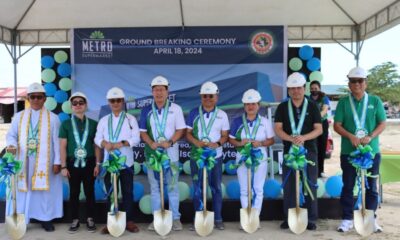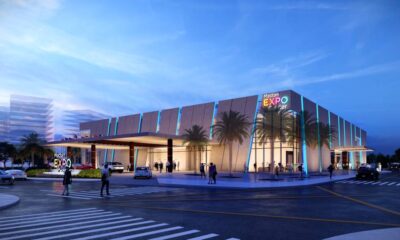Featured
Feature: the Farm That Empowers PWDs
Beaming like the sun, the Sunshine Farm Philippines, a sunflower garden in Lalig, Tiaong, Quezon, has become the people’s solace since it became open to public on February 18, this year.
Lined with exquisite sunflowers, the garden is truly a sight to behold. Indeed, there is something more to this garden than meets the eye.
The sunflower garden, sprawled in all its glory, has become a symbol of hope to some people especially to persons with disabilities (PWDs).
Being in the garden gives them a feeling of fulfillment and empowerment, said 57-year-old farm owner and founder of the Center for Growing and Giving Foundation, Rhodora Palomar-Fresnedi.
It’s because the sunflower garden has become their sanctuary and source of livelihood, since its employees are all PWDs.
An accomplished retiree, Rhodora wishes to give back to the world the good things that were showered upon her. She believes in providing equal opportunities to PWDs and the farm serves as her way of putting into action her advocacy for inclusivity.
“I’ve always supported PWDs and PWD employment,” Rhodora recounted, narrating that aside from formerly being in a profession focusing on global diversity and inclusion, she always believes even at a young age, that everyone no matter what race, skin color, religion, belief, sexual orientation or even physical condition should feel valued.
She said the farm gives a sense of belongingness to PWDs and the feeling of making a difference to the lives of other people, regardless.
“As you grow older you learn what your personal beliefs are and what you are advocating, (and) what changes would you like to see in the world,” Rhodora articulated.
Rhodora was a teacher, accountant, stock exchange announcer, and trained in human resource (HR), business and all. She said these are coming together to form what she calls her “synergized self” which will be her best contribution to the world.
She and her husband had lived and worked in different countries abroad. But being concerned Filipinos, they find themselves coming home to the Philippines, and now they have established the Sunshine Farm out of her love for flower arrangement and her passion to help marginalized people like the PWDs.
On paving the road for inclusivity
When Rhodora came back to the Philippines, she had a conversation with a co-worker who has a son with Down Syndrome. She recounted how this co-worker of her complained about how difficult it is in this country to have a developmentally-challenged family member, making her then want to migrate abroad.
“We went (back) to build the Philippines,” Rhodora told her co-worker, convincing her to help them build a more inclusive Philippines, instead of just leaving, so that by the time her son is 18 there would be more opportunities for him and those like him. “That’s how I started Project Inclusion,” she said.
Due to her multinational corporate business background, Rhodora said, she approached the advocacy in a corporate manner. She primarily conducted a research, in partnership with De La Salle University, to prove her hypothesis that hiring persons with intellectual and developmental disabilities (PWIDDs) is good for the person, the team, and the company.
“Given the right condition, PWIDDs can have an exceptional contribution,” she added, citing that based on studies, when PWIDDs were employed they tend to improve, as well as the team and the whole company.
She stressed, studies have proven that hiring people like them develops a better team and better relationships. Also, through their presence in a company, managers learn to give instructions properly and team work also improves.
Rhodora said that they themselves have tested this since their very first employee was a male person with autism. Utilizing her HR know-how, Rhodora plotted a development plan for him.
“First year, tanungin niyo lang siya ng tanungin para sumagot; second year, encourage niyo siyang magtanong; aba noong third and fourth year (ay) nag-jojoke na,” Rhodora narrated, highlighting how they have noticed the dramatic improvements of their pioneering PWIDD employee and how he has brought joy and a different ambience to their team.
(On the first year, we had to ask and ask for him to answer; on the second year, encourage him to ask questions, and by the third year he was already joking)
“Whatever the result of the study, we experienced,” she affirmed.
On establishing the Sunshine Farm
One fine day, Rhodora recalled, a friend living abroad called her and invited her to a dinner which was set to meet with a soil and seed experts. The seed expert showed her a sunflower field and, with her fondness of flowers, which serve as her de-stressors, she was enticed to plant sunflowers.
She requested these soil and seed experts to check the piece of land in Quezon that her family owns and asked them to send a technician who would teach her how to grow sunflowers. The two experts, she said, probably thought at first that she was going to do it just for a hobby, but finally, they took her seriously when she prompted to plant 4,000 seeds.
“But, I want to employ PWDs,” she said, coming up with the literally beautiful idea of sunflower farming with PWDs as employees.
She started coordinating with the PWD association in Tiaong called Samahan ng mga Isinusulong ang mga Kakayahan ng mga may Kapansanan (SIKAP), which she previously helped. It was led by Ben Villanueva as president, who also works for the Municipal Social Welfare and Development Office (MSWDO).
Ben was the first person she communicated with to find PWD farmers who could work in the farm.
Rhodora was then introduced to Edwin, a PWD farmer, and decided to hire him as their mainstay farmer. This became an opportunity for Edwin to earn in a regular basis and, at the same time, enrich his knowledge and skills in farming to which he is passionate of.
The monetary expenses of starting up their field of sunflower never bothered her and at that thime she did not consider making a profit out of it. “I am thinking (only of) PWD employment. Let’s just do a pilot. And then nag-bloom siya… ang ganda niya!”
(It bloomed and it was beautiful.)
Their sunflower field bloomed in December last year which displayed a perfect combination of light and rain, as she described. From planting only few rows of sunflowers, they have gradually expanded the farm, which now covers a bigger and wider field of the family-owned land.
Rhodora said that they used to sell the first few blooms to a point when most of them were gone, leaving only the side blooms. Then later, someone suggested for them to stop selling the flowers and just make visitors pay for their entrance to the farm instead.
The first visitors were their families and friends. They took photos and selfies with the bed of sunflowers during a family affair, and then posted all the photos in social media, and they went viral.
During the first few months of this year, Rhodora said, a number of TV shows visited them almost every week to feature the Sunshine Farm, but she refused telling them it was a private property.
“I kept saying no to media,” said the owner. But Rhodora obliged eventually and from that time on the farm has been featured in televisions and other multi-media platforms.
The farm started to get known via social media and the word of mouth. “They didn’t know that this side of the Philippines can grow sunflowers,” Rhodora said, explaining that it is probably the reason that people wondered and have taken interest of their farm. Even she, back then, did not know sunflowers could grow in the area, saying it was only experimental when she began.
On empowering PWDs
The PWD employees in the Sunshine Farm found not only a job that serves as means of livelihood, but also a family that embraces them for who they are and for what they are capable of.
Joy is one of them. She works as a receptionist who welcomes the guests in the farm. She said it makes her feel good and builds her confidence whenever the visitors treat them well like greeting them with respect.
“Unang una, may pinagkakakitaan ka na bukod sa nalilibang ka pa. Tapos parang nagkaroon ka ng confidence sa sarili mo kasi ngayon may ipinagmamalaki ka nang mayroon ka nang trabaho, hindi ka na lang taong bahay,” said Joy when asked how the Sunshine Farm has helped her.
(First of all, you are earning while also having fun. It also boosts self-confidence because now you have a job and not just a stay-home.)
The same goes with Jen who is also one of the receptionists in the farm. With the opportunity given to her, she was able to help her husband in providing the needs of their family.
SIKAP President Ben shared in an interview, “Ako po iyong unang kinausap ni Ma’am Rhodora na may-ari nito para ipaalam sa akin ang layunin na iyan na pagtulong sa mga may kapansanan… na ang lahat ng magiging empleyado dito ay PWD.”
(I was the one Ma’am Rhodora talked to first to let me know what she wanted to do for PWDs, telling me that all employees here would be PWDs.)
He said he supports the advocacy of the farm owner to elevate and develop the skills and capabilities of people with disabilities not only in farming but in all aspects of development.
Aside from being an exemplary leader to his fellow PWDs, Ben is also knowledgeable in encoding, facilitating, and organizing events. He has also served as resource speaker in various gatherings focusing on community-based inclusive development.
He is a living proof that PWDs like him could do more than what people expect of them. They only need a proper venue like the Sunshine Farm where they can harness their abilities and show how empowered they have become. (Joy Gabrido, PIA4A)

































